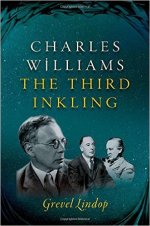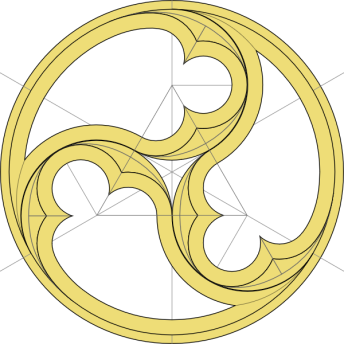 The Charles-Williams-themed two-episode story of Inspector Lewis will air in the US this Sunday, so I’m blogging about it in some detail. Here’s yesterday’s post.
The Charles-Williams-themed two-episode story of Inspector Lewis will air in the US this Sunday, so I’m blogging about it in some detail. Here’s yesterday’s post.
Now, onward! Yesterday, I ended with a quote about how the Way of Exchange is just like carry a heavy box or parcel for someone else. Interestingly, the next shot is of Hathaway’s sister carrying a heavy box through his doorway. He doesn’t get up to take it from her. Rejecting the co-inherent nature of the universe, are you, Gorgeous?
After Beskin’s talk, several of the attendees are talking in a pub. The script is a bit stilted here, but I’ll point out one quick little quote. A character says: “Williams was a minor theologian and no academic” and another says that’s in his favor. This is a topic of conversation in CW scholarship: some writers play up his outsider status, going so far as to call him an autodidact, while others downplay the fact that he had no college degree and emphasize that he taught at Oxford along with Lewis and Tolkien. so, depending on one’s attitude towards higher education, one might say Williams was or wasn’t an “academic.” But he certainly was a minor theologian, if that!
Beskin gets a text message from someone he’s nicknamed “The Lioness.” This introduces an animal symbolism for characters that’s roughly based on the Platonic archetypal animals in The Place of the Lion.
 As Lewis and Hathaway walk to the murder scene, Hathaway says that Beskin was giving a talk on Charles Williams, “The third Inkling.” Is this a nod to the title of Grevel Lindop’s bio, or only a cheerful little staff work of the Omnipotence?
As Lewis and Hathaway walk to the murder scene, Hathaway says that Beskin was giving a talk on Charles Williams, “The third Inkling.” Is this a nod to the title of Grevel Lindop’s bio, or only a cheerful little staff work of the Omnipotence?
Curiously, the shooting script says that Hathaway’s line is “Charles Williams, the Third Inkling, a regular at their pub discussions,” but Laurence Fox didn’t say that bit about CW’s being a regular at the pub discussions—which makes his line more accurate. CW was a regular at the pub discussions, but that wasn’t the Inklings proper. The Inklings proper was the Thursday night meetings in C. S. Lewis’s rooms at Magdalene College, Oxford. That’s when they shared works in progress. The pub discussions were much more informal.
Hathaway, that walking encyclopedia, after reading an obscure quote left with the body, immediately knows that it has something to do with alchemy. Lewis asks: “Turning lead into gold?” And Hathaway replies with a very intelligent answer, one that might have come from A. E. Waite himself—or from Modern Alchemy by Mark Morrisson:
More than that. A precursor to modern science, trying to understand the secrets of nature in order to unlock the mysteries of the universe. … For some alchemy is more of a spiritual process. Converting the lead of ignorance into the gold of enlightenment.
At the station in the morning, did you catch the cute little Tolkien reference? Maddox says: “Hardly the Battle of Helm’s Deep.” 🙂
Now, here’s a point where Hathaway makes a mistake. Lewis looks at the alchemical quote found on the body and says:
You were right about the alchemy. Quote is from a seventeenth century German alchemist. Question is, what’s that got to do with murder? Or Charles Williams? Did Williams write anything about alchemy?
In the script, Hathaway replies:
Not that I know of. Everything but. The Grail. Tarot. Ritual magic. But not alchemy. Wrote theology, supernatural novels and was something of a mystic. (a glance at MADDOX) No film franchises yet.
[That’s pretty sweet, considering several of us, including the author of “Magnum Opus,” really want films made of the seven novels!]
This line is considerably shortened in the episode. Hathaway only says: “Wrote theology, supernatural novels and was something of a mystic.”
But of course, CW did write a lot about alchemy. Not much of it was very explicit—it was the spiritual kind, not the metallic kind—but his play The Chaste Wanton is explicitly about alchemy. Got one wrong, Cutie!
The screenwriter, Chris Murray, told me that this separation between CW and alchemy was a deliberate choice. He wrote to me that
the story is kind of a clash between some people into CW and someone into alchemy and in order to get not one but two esoteric notions into a mainstream TV show (normally producers get very nervous of anything esoteric) I had to simplify massively and keep stating as part of the detective puzzle ‘but there is no link between CW and alchemy, they are two entirely separate things’ when I know full well that in fact there is a degree of crossover and that CW did touch on notions of spiritual alchemy… but that all got edited out over the process.
So there you are. Poor Hathaway had that mistake written into his script. What’s a fictional character to do? This separation between Williams and alchemy is emphasized more and more as the story goes on, which I find very confusing.
Hathaway also doesn’t catch on when they find that Beskin’s contact list had not only “The Lioness” but also “The Butterfly,” “The Serpent,” and “The Eagle.” But it’s not long before he picks up a copy of The Place of the Lion at Beskin’s house and remembers. Aha! These animals are characters in that novel! Beskin’s sister is the Serpent. Don’t bother asking who the other two are, though; Murray told me he doesn’t know.
Around about 16:30, a tattoo is revealed on Beskin’s chest. It’s this coinherence symbol, that I’ve used several times on the blog:

By 1stEc.Domnowall, 2ndUser: Perhelion – tonquedec et église,melrand et chapelle,berrien et chapelle,cruas, CC BY-SA 3.0, https://commons.wikimedia.org/w/index.php?curid=18250014
And here’s a funny thing. Do a google image search for “coinherence.” OK? Have you done it? What did you come up with? The first image is probably that one. And what’s the source? My blog. Yeah, but that’s not my image. But if you google “perichoresis,” you find that the image is on Wikipedia. Again, Chris Murray shows his brilliance behind the scenes, in making that visual connection between “coinherence” and “perichoresis.” Nicely done. There’s more about this symbol later, too.
Now, the Easter egg! At 18:00, Carina Sargent picks up a printed copy of her brother’s talk on Charles Williams. Here’s a screen shot:

Do you recognize that? It’s this blog! It’s my Introduction post! Hooray. We’re famous.
Come back tomorrow for more.

Thank you.
Sent from my iPad
>
LikeLike
Pingback: Notes on “Magnum Opus” Part 3 | The Oddest Inkling
“But he certainly was a minor theologian, if that!” Unless, perhaps, he was a major theologian (!): cf. for example, Brian Horne’s doctoral dissertation on the Systematic Theology of Charles Williams.
LikeLike
“Carina Sargent picks up a printed copy of her brother’s talk on Charles Williams”, indeed! Why, that scumball Phil Beskin is as outrageous a plagiarist as, as… (many a successful academic or mainstream journalist?)!
LikeLike
Might the “animal symbolism for characters” be an ominous intertextual clue for C.W. readers who know how things turned out with various members of the apparently innocuous study circle in The Place of the Lion (and, further, a bit of disturbing characterization with respect to people who know how the story turned out there, and still play with adopting details in this way)?
LikeLike
By the way, will you be reviewing the new C.W. novel reprint series, recently noted on the Society website as beginning with The Place of the Lion? I’d like to know more about it – especially with reference to the text being reprinted. (Is it from a copy of the first edition? Are any errors corrected – silently or otherwise?)
LikeLike
Dunno…it’s a pretty poor programme, barely scaffolded by its Oxford backdrop. Dreadfully written, acted, and characterised. Seems to me they raid subjects like the Inklings as mere grist for their own thin gruel, and abuse these subjects when they do. Maybe from an American vantage point it appears more than it really is…
LikeLike
Would you venture to sketch a quick comparison with Inspector Morse – as it went along (and its dramatizations with the novels – which I have as yet to try!)? For example, I (in some senses) especially enjoyed Masonic Mysteries, and yet… how far was it fetched and taking what improbable liberties?
LikeLike